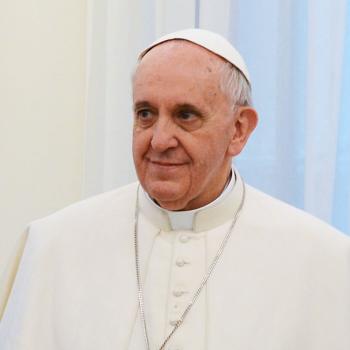Editors' Note: This article is part of the Public Square 2014 Summer Series: Conversations on Religious Trends. Read other perspectives from the Pagan community here.
My brothers and sisters, we have sinned.
Those of us who come to the Old Ways from elsewhere frequently cast off the notion of sin at the outset and never look back. But in this we have, if you'll pardon the witch joke, chucked out the baby with the broth water.
For sin—an offense committed against another and, in particular, against a god—was an active category in our peoples' thought long before the word was taken up by others.
The Hebrew word het' is drawn ultimately from the vocabulary of archery. (We must remember that Hebrew is at heart just another Canaanite language.) It means "to miss," as in to miss a target (Ernest Klein, A Comprehensive Etymological Dictionary of the Hebrew Language for Readers of English, 213). Interestingly, Greek hamartía means exactly the same (Henry George Liddell and Robert Scott, A Lexicon Abridged from Liddell and Scott's Greek-English Lexicon, 38). Whether this is sheer coincidence, or evidence of a larger Mediterranean intellectual koine transcending linguistic boundaries, it is difficult to say. But we surely cannot deny that down the long years, our behavior toward the gods of our people has fallen far short of where it should be.
That the English word sin derives ultimately from the Indo-European root *es-, "to be," has long puzzled scholars and philosophers. Philologist Calvert Watkins suggests that the word takes its origin in the way the ancestors confessed to crimes and misdeeds. Is this your deed? It is. A sin, then, is an admission that "it (the misdeed) is so" (Calvert Watkins, ed., The American Heritage Dictionary of Indo-European Roots, 25).
We have sinned against Earth. We have fouled her beauty. We have taken greedily without giving back. We have multiplied without thinking.
We have sinned against Sea, and all Waters.
We have sinned against Thunder, having poisoned His rains.
We have sinned against the Winds, having fouled Their air.
We have sinned against the Green One, Lord of Plants.
We have sinned against the Horned One, Master of Animals.
My brothers and sisters, we have gone wrong.
There is personal sin and corporate sin. It is easy enough to say, "I'm doing what I can." But corporate sin incurs corporate penalty, not so much in punishment as in consequence. In these corporate sins against the gods of our people, we ourselves are actively implicated, and as our sins have been collectively performed, so collectively we must expect to share in their outcome. As the gods freely give their gifts to us all, so we must expect that they also will mete out their response to us all, and neither our prayers, nor our supplications, nor our magic can avert it. The gods will act in accordance with their own nature, as they always do. We may call it "climate change" if we wish. It remains, at heart, a problem of relationality, by nature deeply religious.
Let us accept this truth and prepare ourselves to meet it.
In fact, by our collective actions, and in particular by our greed, we have changed the gods themselves. This is a theologically vast statement, the repercussions of which we are only now beginning to grasp. To take only one example, we now see the behavior of Thunder (in Whom theology and meteorology meet) growing increasingly violent and erratic. The gods themselves have changed in response to our actions, and we must renew our relationship with them as we now find them. There are no viable alternatives. Alain Daniélou observed in 1979 that the great virtue of the Old Ways is that they treat with the world as it is, and not as we wish it were (Alain Daniélou, Shiva and Dionysus, 164).
We must first confess our sin. With the ancestors, we must say: It is so. Then we must change direction.
We must learn to do without.
We must learn to make do.
We must learn to make our own.
We must learn to raise our own.
We must learn to practice considered compassion. The tragically shortsighted "humanitarianism" of the so-called Green Revolution, however well-intentioned, has created an ecological disaster. Our kind is important, but not to the exclusion of everything else.
Most importantly, we must learn to view the essence of our existence as relationship, with both the human and the non-human worlds alike, for that is what it truly is.
The ancestors knew all of these things, and if we are truly wise, we will relearn them before it is too late.
My brothers and sisters, we have sinned, sinned grievously, against the gods of our people.
Let us stop, and reconsider, and change direction.
7/23/2014 4:00:00 AM




